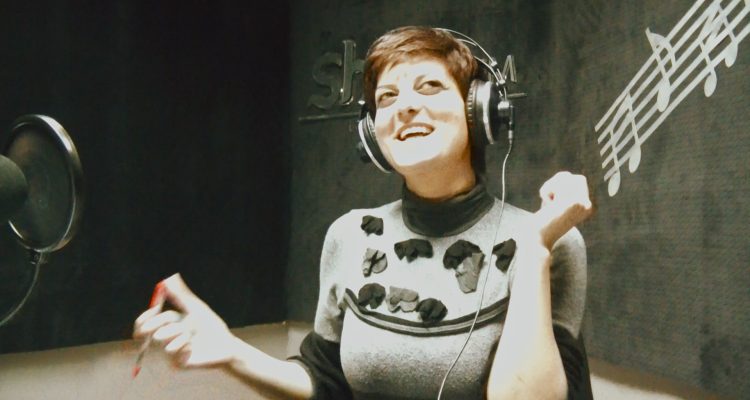In 2011, in the early days of the Syrian revolution — back when it was still a series of protests and not yet a full on revolution — radio DJ Obaidah Zytoon and her rag-tag band of friends took to the streets with a hopeful curiosity. They were revolutionaries at heart, some with prior arrest records, who were eager to see the merciless Bashar al-Assad removed from power, and, being young, they recognized the power of the video camera and the necessity to document the horrors unfolding. The resulting documentary, “The War Show,” bears ample evidence of this early, sporadic documentation, but once the film settles in it subtly manages to evolve into a stirring and deeply emotional account of a country coming undone. At a more personal level, though, ‘War Show’ becomes a portrait of a group of friends once eager to build a new world who are slowly decimated by the brutality of war.
“The War Show” opens with Zytoon and her friends opportunistically taking part in the protests that began to pock Syria in 2011. They are young and rebellious and stoned just like any other directionless 20-somethings the world over. And, as directed by Zytoon (and Danish doc helmer Andreas Dalsgaard), the film lingers here, basking in the glow of impending, optimistic change, introducing the varied cast that orbits Zytoon to some degree or another and whose lives are about to drastically change. There is something akin to urgency in their youth, in the way they languish in it, as though life as they know it is about to end — a haunting, lovely slight of hand executed both by these young women and men in their actual lives and by Zytoon and Dalsgaard in their shaping and presentation of the story years after the fact.
 And end it does, with the earth shattering force of artillery. After Assad realized the protests couldn’t be quashed, his armies began resorting to lethal force and the revolutionaries pushed back in kind. But not without chaos. Which is one thing “The War Show” imparts with ease, if only because when the uprising began in earnest, it began sporadically, with militias materializing around the country, some secular, some Islamic, some extremists, many at odds, and some, like the al-Nusra Front and ISIS declaring war on the others. Such a war was bound to be cruelest to the idealistic and ambitious likes of Zytoon and her friends.
And end it does, with the earth shattering force of artillery. After Assad realized the protests couldn’t be quashed, his armies began resorting to lethal force and the revolutionaries pushed back in kind. But not without chaos. Which is one thing “The War Show” imparts with ease, if only because when the uprising began in earnest, it began sporadically, with militias materializing around the country, some secular, some Islamic, some extremists, many at odds, and some, like the al-Nusra Front and ISIS declaring war on the others. Such a war was bound to be cruelest to the idealistic and ambitious likes of Zytoon and her friends.
Where “The War Show” succeeds most is in its timely, unflinching portrayal of war-torn Syria. It is not a film that attempts to encompass the deep complexities of the conflict, but rather to simply offer a lens into the heart of it, from one perspective. This stays true even as Zytoon attempts in earnest to document the war, traveling from her home town to Homs to bear witness to the violence and suffering there, where men and boys are eager to pull up their shirts and lay plain the horrendous brutalities of Assad and the Syrian government. ‘War Show’ is claustrophobically limited to the moment, to Syria, to Syrians, and to Zytoon and her friends — for better and worse.
 It takes a good portion of the film’s running, though, before any of the natural gravity of the situation is harnessed by the filmmakers. For all the intimacy allotted the camera, the loose and meandering scenes of friendship never achieve transcendence in the moment — only later do these scenes become haunting, and quite beautifully so. But it makes for a saggy, unengaging first half, which, despite its timeliness and inherent importance, prevents it from greatness.
It takes a good portion of the film’s running, though, before any of the natural gravity of the situation is harnessed by the filmmakers. For all the intimacy allotted the camera, the loose and meandering scenes of friendship never achieve transcendence in the moment — only later do these scenes become haunting, and quite beautifully so. But it makes for a saggy, unengaging first half, which, despite its timeliness and inherent importance, prevents it from greatness.
But, despite these technical shortcomings, “The War Show” is a feat of a film unique to the modern era: a war story of a war not yet solved, a refugee’s journey abroad but not yet home, a goodbye letter to a country not yet gone. At its weakest, ‘War Show’ is an uneven and sluggish story of revolution, but at its best it is a deeply personal story of hope, love, friendship, and the loss of everything and everyone. [B-]
Click here for our complete coverage of the 2016 Toronto Film Festival

